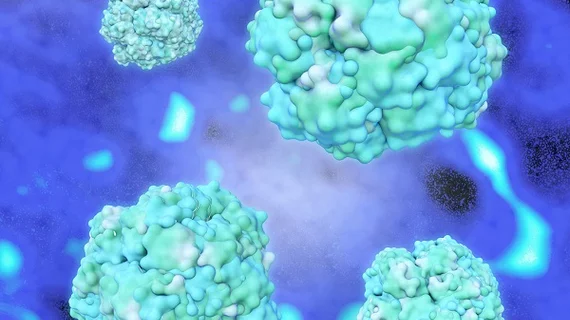Researchers ID potentially treatable genetic mutation target for therapy-resistant prostate cancer
Many patients with cancer resistant to prostate-specific membrane antigen-targeted therapy have genetic DNA mutations that may be treatable, new exploratory research finds.
Using a novel approach called targeted next-generation gene sequencing, German scientists identified mutations in six out of seven patients with metastatic castration-resistant cancer who didn’t respond to PSMA radiopharmaceutical therapy. This is despite all participants containing sufficient PSMA expression in their tumors suggesting their form of the disease should have been receptive to such treatment, a team out of Heidelberg University Hospital reported in the Journal of Nuclear Medicine.
“A relatively new technique, targeted next-generation sequencing, allows rapid analysis of an individual tumor’s genome,” Clemens Kratochwil, MD, supervising physician for radionuclide therapy at the university, said in a statement. “Theoretically, such information can be predictive as to whether a patient has an increased probability to benefit from one specific treatment or combination therapy.”
PSMA-targeting α-radiation therapy (PSMA-TAT) with 225Ac-PSMA-617 is emerging as a promising treatment for even the toughest prostate cancers, but some research has reported up to 37% of patients don’t respond even with sufficient PSMA expression. And additional studies have proven that certain DNA damage-repair-associated gene mutations affect a patient's response to such therapy.
Kratochwil et al. identified 10 out of 60 patients treated with 225Ac-PSMA-617 PSMA-TAT who responded poorly to the therapy. CT-guided biopsy samples taken from seven of them and analyzed via two separate targeted next-generation-sequencing panels showed mutations in 37 DNA-damage recognition, damage-repair, or checkpoint signaling genes. And in seven samples, the group detected 15 whole-gene deletions.
There are a number of important factors, however, to determine if the manpower and cost of such sequencing will be clinically necessary, Kratochwil said.
For one, the mutation “must be druggable in order to be led to a change in therapeutic management.” Additionally, if the mutations are very rare, even advanced testing would not be warranted. Lastly, Kratochwil noted, if a number of patients showed similar mutations, individual testing could be replaced with a “one-size-fits-all approach."
“Once it can be confirmed that a large number of patients receiving PSMA-TAT are simultaneously harboring potentially druggable mutations in genes that are causal related to radio-sensitivity, then clinical evaluation (and hopefully one day routine application) of combination therapies with the potential of over-additive efficacy will become available,” he concluded.

